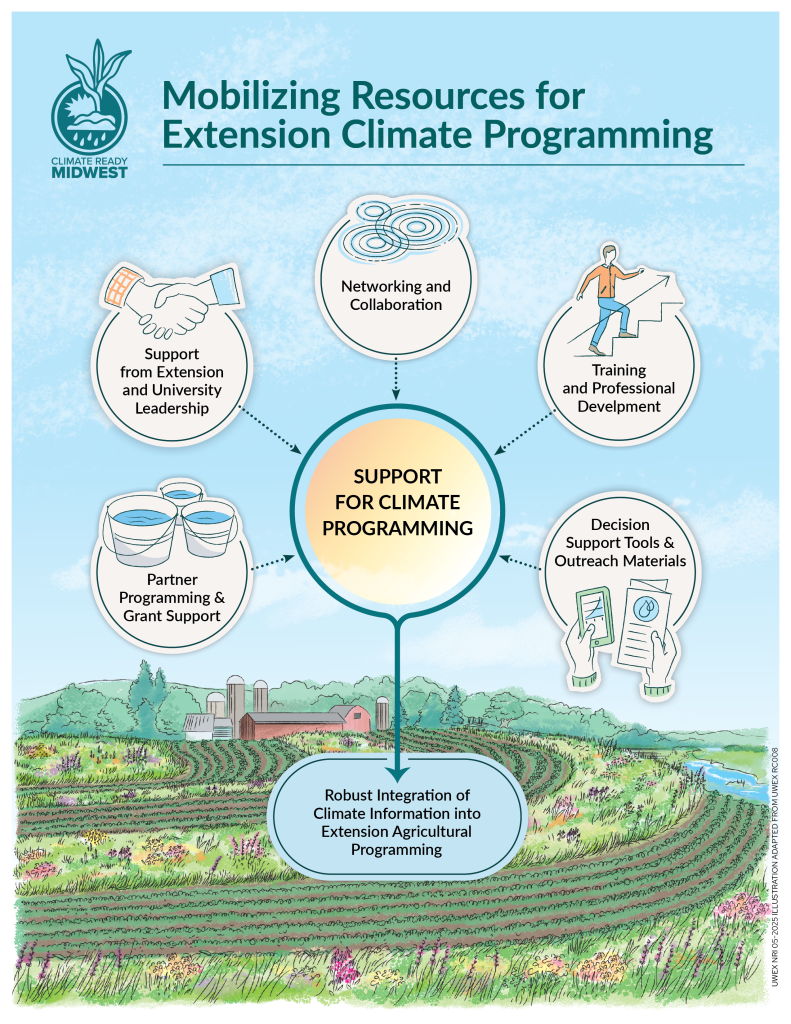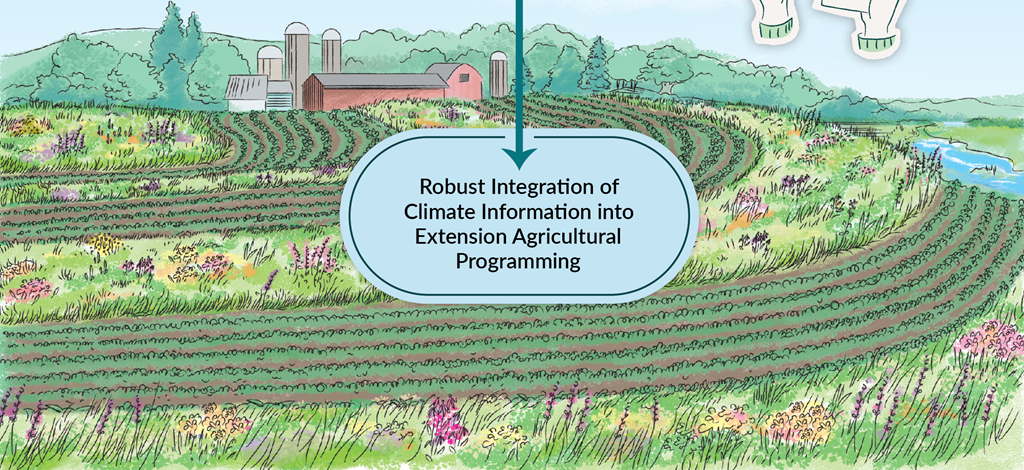Charting the Course: A Roadmap for Climate-Ready Programing in Extension
After three years of interviews, focus groups, and team collaboration, we’re excited to share the Climate Ready Midwest Roadmap!
Launched in 2022, the Climate Ready Midwest project set out to develop a shared roadmap, or a strategic guide, to empower Extension to lead in climate-informed agricultural programing. Our end result represents the voices of educators, specialists, program managers, and institute directors at 1862 Land Grant University (LGU) Extension across the Midwest and it reflects what’s needed to support and scale climate programming at Extension.
Despite the diversity of perspectives, five key areas of investment consistently emerged loud and clear. Those were:
- Partner Programming and Grant Support: Collaborative partner programming is essential as Extension is only one component of the larger network supporting producers. Equally essential is partner grant support to boost and heighten extension work.
- Outreach Materials and Decision-Support Tools: A throughline in our interviews was the need for outreach materials and decision-support tools to empower Extension educators to integrate climate into their agricultural programming. Many great materials and tools already exist and more are being created, but they need to be accessible, adaptable, and well-promoted to fit into existing Extension work.
- Support from Extension and University Leadership: Establishing climate as an organizational priority, providing staff with financial support for appropriate professional development, and creating safe spaces for staff to discuss climate issues are some of the critical ways leadership can support climate-informed programming.
- Networking and Collaboration: Dedicated time and resources for continual networking and collaboration among and between Extension colleagues and partners is necessary for resource distribution and success sharing.
- Training and Professional Development: Training and professional development is key to building capacity to integrate these topics and the pertinent outreach and decision-support tools into existing Extension programming.

Our efforts show that investment in these five areas will result in comprehensive support for climate programming. With comprehensive support, we will start to see robust integration of climate information into Extension agricultural programming.
We hope this roadmap will:
- Demonstrate for leadership the importance of investing in the areas listed. “Investment” can be financial, but it can also be through supporting partnerships, leadership commitment or in other ways.
- Allow individuals and/or groups to see how they fit into the bigger picture. What gaps do they fill? What leverage points do they have? How are they acting as part of the solution?
For example, the North Central Climate Collaborate (NC3) is a regional Extension group that provides Networking and Collaboration and Training and Professional Development for Extension professionals around climate topics. (Learn more about NC3 here!) Thus, NC3 contributes to two of the five investment areas for the North Central Region. As a group, NC3 can use this roadmap to decide – should they continue to invest in their current areas of focus? Are there gaps that are limiting regional success more so, gaps that they could help address? Where are there opportunities for partnerships to address gaps or strengthen current efforts? This kind of inquiry can be done at a regional, state, or even programmatic level in thinking about how we build support for staff and especially in strategic planning.
We encourage you to explore the full roadmap and consider how your work aligns with these five key areas!
What‘s next for the project?
Throughout the end of the year, we will be wrapping up our grant activities, including an activity guide of Carbon Smart Gardening activities for 4H and publications sharing our results.
How can I stay updated?
We will post regular blog posts on this website to share progress and project deliverables, just like this post. Sign up to be notified about future blog posts!
If you are interested in learning more or collaborating on any of this work, please reach out to Alli Wenman, project manager, at alli.wenman@wisc.edu or Aaron Wilson, project director, at wilson.1010@osu.edu.
Additional News:
We’re in the news!
Our team was interviewed on the importance of the Climate Hubs to our work serving producers. Read the article here.
Assessing the Climate Hubs
Washington and Lee University is conducting a survey to assess the USDA-Midwest Climate Hub’s climate services that are used to share information and make decisions.
Your feedback will help the hub to better serve you by providing information that is tailored to your needs. This survey will gather information to gain a better understanding of the value of these services and identify areas for improvement.
We would appreciate it if you could take a few minutes to complete the survey and share any insights you may have. (SURVEY LINK)
If you have any questions or concerns, please contact the Principal Investigator, Ryan McCoy (rmccoy2@wlu.edu, 540-458-8252), or Kristine Micheletti (Kristine.micheletti@usda.gov).
This work is supported by the Agriculture and Food Research Initiative, project award no. 13429389, from the U.S. Department of Agriculture’s National Institute of Food and Agriculture. Any opinions, findings, conclusions, or recommendations expressed in this publication are those of the author(s) and should not be construed to represent any official USDA or U.S. Government determination or policy.
